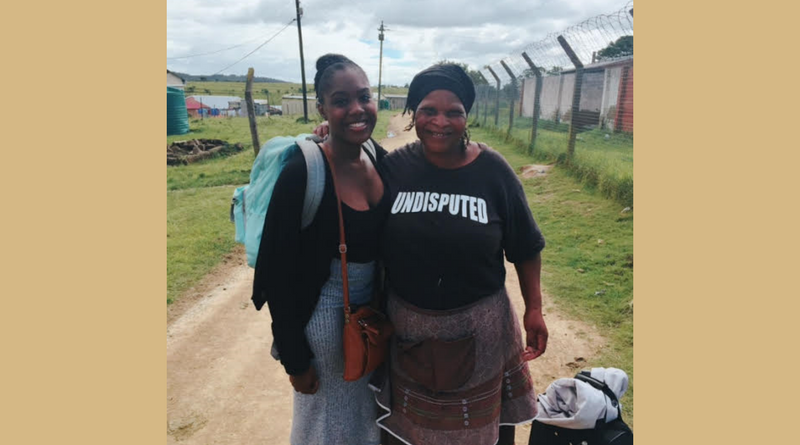By: Essence Buckman, Staff Writer
I’ve already been in South Africa for one month and I can’t believe that much time has passed. These past two weeks have been adventurous, filled with excursions, museum visits and my first experience living in a true, rural setting.
My program is headquartered in Capetown, but we got to fly out to Jo-burg to visit multiple museums and Soweto, where Nelson Mandela lived for a time. His house there was turned into a museum. Our week in Johannesburg was busy for my classmates and me. Unfortunately we didn’t get to go explore recreational or night life because we didn’t have much time and we were advised against it for safety reasons. During our visits to the museums we learned about Afrikaaners, apartheid and saw a prison where white people were held. I learned a lot of history visiting those different places. We also went to Freedom Park, which was an emotional experience due to its historical walkthrough of slavery and the horrible treatment of natives throughout time.
The most memorable experience of Jo-Burg week, however, was the visit to a township. We visited the nicest parts and the opposite. Everyone, including our academic advisor, was surprised when our vans stopped outside a home in a poorer part of Soweto. It wasn’t a part of the plan to visit someone’s home. The tour guides insisted it was fine, but some of us felt like it was disrespectful.
As we walked up to the home, the woman outside looked startled. Our guide spoke to her in her native language. It seemed like he was asking her permission for the first time right then, which made us even more uncomfortable. Some of us chose to go in her home, but others chose not to.
Our guide could sense our discomfort. He said, “These people may be poor, but they are not miserable.” The problem wasn’t that we were judging how she lives but that we felt like we were exploiting her. This experience caused me to consider how tricky and complicated tourism can be.
Our guide recommended that we donate to her as well as buy items at a market that was in front of our bus. After, he asked us for tips. I gave to the woman and bought an item form the market because I felt compelled to, yet I felt like giving to them made it seem like I was pitying them. My classmates and I kept trying to convince ourselves that this is the only way some people can make a living, and to help in any way is the right thing to do. I’m still conflicted about that experience, for reasons relating to privilege and cultural differences. This was an indescribable learning experience.
Another learning experience was when my prgram lived in Eastern Cape in the village of Tshabo for a week. In groups of two we moved into our second homestay families. Including the two homestay students, there were 11 people in the family. We were living in one big room that contained the living room, bed rooms and kitchen. Any concept of privacy was non-existant. This was difficult for me because I like to have alone time. Also, the mother and other family members couldn’t speak much English and as my classmate and I didn’t know much Xhosa. Although there was a language barrier, as the week went by we became more comfortable with each other and communicated better.
From the heat, to open grassy areas, to no privacy, to the outside bathroom, to being woken up by a lot of buzzing flies, to having a variety of farm animals, to dodging stepping into animal feces when I walk, to washing in a bucket—this was a really humbling experience. However, I enjoyed it because it was a reminder of the simple life. I appreciated our host family welcoming us and it warmed my heart. Leaving after only one week was emotional. I felt loved by them during the whole stay. We made a bonfire and had smores for the children before we left.
While I’ll have many fond memories of this journey so far, there have been obstacles. Sometimes, my experience are overshadowed by frequentmicroagressions from my own classmates. This trip is very complicated as I have mentioned before. We are in South Africa and a lot of this experience is race-related, both academically and socially.
I hate that my homestay experience was a bit tainted by that, I still have until May in the country. I feel that my program is not like the typical study abroad program experienced by other Wofford students. Unfortunately, sometimes I deal with uncomfortable situations similar to those I experience at Wofford. Regardless, I think it is growing me in various ways.
The most important takeaway from these two weeks is the constant reminder that black is beautiful. My most memorable moment was a visit to the local high school in Tsabo, a place the western world would consider “uncivilized” and too rural. After I left the grade 11 class, I stood in front of the door and told all of those beautiful, black children this: “I wish you all the best in your future endeavors. I hope you achieve all your dreams. And remember, black is beautiful.” Then I held up my fist. I felt compelled to say that before I left because they deserve to be told they are worthy in a society that plans for most of them to fail. That, of course, overshadows the trials and tribulations I’ve faced the past two weeks.
This experience keeps building me up and breaking me down, and it continues…






























